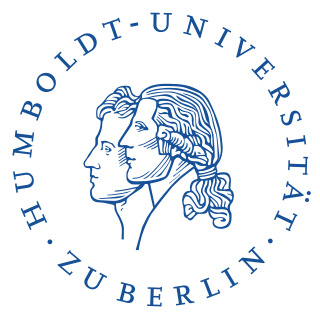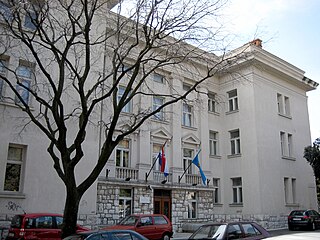
The University of Bonn, officially the Rhenish Friedrich Wilhelm University of Bonn, is a public research university located in Bonn, North Rhine-Westphalia, Germany. It was founded in its present form as the Rhein-Universität on 18 October 1818 by Frederick William III, as the linear successor of the Kurkölnische Akademie Bonn which was founded in 1777. The University of Bonn offers many undergraduate and graduate programs in a range of subjects and has 544 professors. The University of Bonn is a member of the German U15 association of major research-intensive universities in Germany and has the title of "University of Excellence" under the German Universities Excellence Initiative.

ETH Zurich is a public research university in Zürich, Switzerland. Founded in 1854 with the stated mission to educate engineers and scientists, the university focuses primarily on science, technology, engineering, and mathematics. It consistently ranks among the 20 best universities in the world and its 16 departments span a variety of disciplines and subjects.

The Ludwig Maximilian University of Munich is a public research university in Munich, Germany. Originally established as the University of Ingolstadt in 1472 by Duke Ludwig IX of Bavaria-Landshut, it is Germany's sixth-oldest university in continuous operation.

The Humboldt University of Berlin is a public research university in the central borough of Mitte in Berlin, Germany.
An academic department is a division of a university or school faculty devoted to a particular academic discipline. This article covers United States usage at the university level. In the United Kingdom and other Commonwealth countries, universities tend to use the term faculty; faculties are typically further divided into schools or departments, but not always.

Chittagong College is a public educational institution in Chittagong, Bangladesh. It is a higher secondary school and also a degree awarding college of National University. It is the second higher secondary school in Bangladesh, established in 1871 after the Dhaka College. It was previously affiliated by the University of Chittagong.

Barbara Liskov is an American computer scientist who has made pioneering contributions to programming languages and distributed computing. Her notable work includes the introduction of abstract data types and the accompanying principle of data abstraction, along with the Liskov substitution principle, which applies these ideas to object-oriented programming, subtyping, and inheritance. Her work was recognized with the 2008 Turing Award, the highest distinction in computer science.
In higher education, a course is a unit of teaching that typically lasts one academic term, is led by one or more instructors, and has a fixed roster of students. A course usually covers an individual subject. Courses generally have a fixed program of sessions every week during the term, called lessons or classes. Students may receive a grade and academic credit after completion of the course. Courses can either be compulsory material or "elective". An elective is usually not a required course, but there are a certain number of non-specific electives that are required for certain majors. The entire collection of courses required to complete an academic degree is called a program of studies.
Physics education or physics teaching refers to the education methods currently used to teach physics. The occupation is called physics educator or physics teacher. Physics education research refers to an area of pedagogical research that seeks to improve those methods. Historically, physics has been taught at the high school and college level primarily by the lecture method together with laboratory exercises aimed at verifying concepts taught in the lectures. These concepts are better understood when lectures are accompanied with demonstration, hand-on experiments, and questions that require students to ponder what will happen in an experiment and why. Students who participate in active learning for example with hands-on experiments learn through self-discovery. By trial and error they learn to change their preconceptions about phenomena in physics and discover the underlying concepts. Physics education is part of the broader area of science education.

The University of Rijeka is in the city of Rijeka, Croatia, with faculties in cities throughout the regions of Primorje, Istria and Lika.

Tumkur University was established in 2004 in Tumkuru, Karnataka, India. It was carved out of Bangalore University to accommodate the needs of the students from Tumkuru district. Established under the Karnataka State Universities Act, 2000, as a multi-faculty university, it has 12 postgraduate departments, 2 constituent colleges and 94 affiliated colleges. It established 29 research centres to promote advanced multi-disciplinary research and academic collaborations. In 2012, the university was recognized under section 12(b) of the UGC Act, 1956. In the same year, the National Assessment and Accreditation Council (NAAC), an inter-university council of the UGC, accredited the university with "B" Grade in the three-grade rating scale.
Clifford Victor Johnson is a British theoretical physicist and professor at the University of California, Santa Barbara department of Physics.

Sidho-Kanho-Birsha University (SKBU) is a public state university located in Purulia district of West Bengal, India. It was established under an Act of the West Bengal Legislature on April, 2010. It offers different undergraduate and postgraduate courses in liberal arts.

Kaduna State University is located in Kaduna, Kaduna State, Nigeria. It was established in 2004. It has seven faculties with over 39 departments and a library that contains over 17,000 volumes of books. It has two campuses: Kafanchan and Kaduna.

The École pratique des hautes études, abbreviated EPHE, is a French postgraduate top level educational institution, a Grand Établissement.
Mathematics is a field of study that investigates topics such as number, space, structure, and change.

Faculty of Science is a faculty of the University of Zagreb that comprises seven departments - biology, physics, chemistry, mathematics, geophysics, geography and geology. The Faculty has 288 full professors, associate and assistant professors, 180 junior researchers and about 6000 students.
Coleridge's theory of life is an attempt by Samuel Taylor Coleridge to understand not just inert or still nature, but also vital nature. He examines this topic most comprehensibly in his work Hints towards the Formation of a more Comprehensive Theory of Life (1818). The work is key to understand the relationship between Romantic literature and science.

The New York University Department of Philosophy is ranked 1st in the US and 1st in the English-speaking world as of the most recent edition of the Philosophical Gourmet Report from 2021. It is also ranked 1st in the world by the 2023 QS World University Rankings, and is internationally renowned. It has particular strengths in epistemology, history of philosophy, logic, metaphysics, moral and political philosophy, philosophy of language, philosophy of logic and philosophy of mathematics, and philosophy of mind. The department offers B.A., M.A., and Ph.D. degrees in philosophy, as well as a minor in philosophy and a joint major in language and mind with the NYU Departments of Linguistics and Psychology. It is home to the New York Institute of Philosophy, a research center that supports multi-year projects, public lectures, conferences, and workshops in the field, as well as outreach programs to teach New York City high school students interested in philosophy.
The Princeton University Department of Physics is an academic department dedicated to research and teaching at Princeton University. The associated faculty members, researchers, and students have been recognized for their research contributions, having been awarded 19 Nobel Prizes, four National Medals of Science, and two Wolf Prizes in Physics. Notable professors, researchers, and graduate students affiliated with the department include Richard Phillips Feynman, Joseph H. Taylor, Jim Peebles, Eugene P. Wigner, and John von Neumann. In addition, the department offers degree programs for bachelor's students (A.B.) and doctoral students (Ph.D.).












